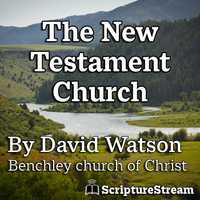Local churches are authorized to provide for the preaching of the gospel, continued
Overview of New Testament passages, continued
- Acts 11:21-23 – “they sent Barnabas”
- Acts 13:1-3 – “teachers … they sent them”
- Acts 14:26 – “commended … they began to report”
- Acts 15:1-3 – “sent on their way by the church”
- I Corinthians 9:1-18 – “get their living from the gospel”
- The general principal is that those who work should receive compensation for their work.
- Apparently, the Corinthians never paid Paul while he worked with them and he did not ask because he knew their spiritual maturity level was not high enough. See Acts 18:1-5. When Silas and Timothy arrived, Paul turned completely to teaching and preaching.
- I Corinthians 9:13 – See Nehemiah 13:10-14. Nehemiah reprimanded the people for not handling the tithes correctly and paying the priests as they should.
- I Corinthians 9:14 – A preacher has authority to be supported by his work.
- I Corinthians 14 – “for edification”
- I Corinthians 14:1-4, 26-33, 40 – In the days of spiritual gifts, those gifts could be controlled. The focus was always to be edification for those who heard. Things were to be done properly and in order.
- We no longer have spiritual gifts, but we have assemblies that need to be done properly and in order, with the focus being edification.
- II Corinthians 11:7-9 – “I robbed other churches”
- This is figurative language. He’s making the point that the church in Corinth should have supported him but did not.
- Philippians 1:3-5; 4:14-18 – “participation in the gospel”
- The church can send money to someone preaching the gospel in another place.
- I Thessalonians 1:6-10 – “sounded forth from you”
Observation: The money was sent directly to the preacher.
- Acts 15:3 – Antioch to Paul and Barnabas
- I Corinthians 9:1-18 – Corinth should have paid Paul.
- Philippians 4:14-15 – Philippi to Paul
- II Corinthians 11:7-9 – Multiple churches sending money to Paul.
- There were no additional organizations involved. The money was sent directly to the preacher.
- In modern times, the sponsoring church arrangement has developed, in which multiple churches send money to a single church, which then supports a preacher.
- First, there is no authority for churches to pool money together for evangelism.
- II Corinthians 11:8; Philippians 4:15 – Was Philippi the sponsoring church? There is no reason to connect these two passages. There is no evidence this was the same occasion.
- Second, local churches – which should have independent function and local oversight – give away control of the money they send.
- Acts 14:23; I Peter 5:1-2
- We never read anything of a collective larger than a local church.
- Wayne Goforth, “Why I Left the Institutional Position”
- Stick to the simple New Testament pattern!
- First, there is no authority for churches to pool money together for evangelism.
